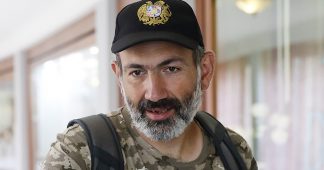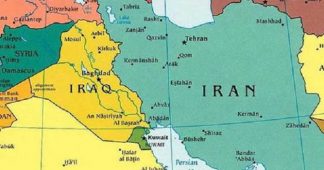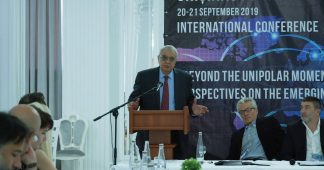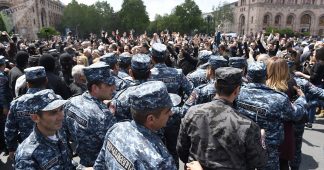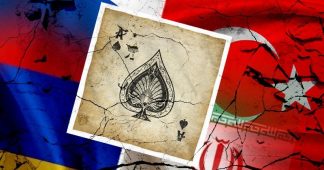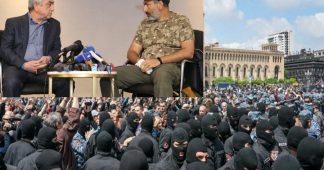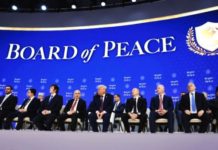May 22 2020
Pashinyan and Aliev’s joint victory over Armenia and Artsakh
Politician David Shahnazaryan is the guest of Yerevan.Today’s “Freedom of Speech” program. We discussed the controversial draft resolution adopted by the European Parliament’s Foreign Affairs Committee on May 19.
– Mr. Shahnazaryan, a few days ago you said that a project has been prepared in international instances, in which one may notice a very dangerous point for the Republic of Armenia and the Artsakh Republic. Would you please open the brackets, what is it about?
– I want to recall the event which took place yesterday, in Brussels. The European Parliament’s Foreign Affairs Committee voted in favor of the draft resolution, which represents the European Parliament’s recommendations to the Council of Europe, the European Commission, and the EUSpecial Representative for the EU’s Eastern Partnership in relation to the EU policy. The last time such a document was adopted on November 15, 2017, a few days later of which, on November 24 a historic document, the Comprehensive and Enhanced Partnership Agreement (CEPA), was signed between Armenia and the EU.
I would like to talk about a few points that are included in the draft adopted yesterday. If we compare the 2017 resolution and the draft adopted yesterday, which, by the way, has been adopted by the Foreign Affairs Committee so far and will be put to a vote in the June 17-18 plenary session, we will see that it is as different as night and day. The 2017 document mentioned Armenia’s role and significance, the importance of signing an argeement, it was noted that Armenia, being a member of the Eurasian Economic Union, is now signing an agreement with the EU, and other words of praise.
The draft adopted yesterday has nothing in common with the previous one. The EU’s interest in Armenia has reduced to zero, if not to mention that it turned to negative. In particular, the 2017 resolution on the Nagorno-Karabakh conflict clearly stated that the settlement should be based on the three basic principles enshrined in a joint statement issued by the OSCE Minsk Group Co-Chairs in 2009: territorial integrity, self-determination of peoples, non-use of force or threat of force. And in the preface of the Armenia-EU agreement signed on November 24, 2017, the above-mentioned principles were fixed as a basis for the settlement of the Nagorno Karabakh conflict. The draft adopted yesterday does not include the above-mentioned principles, they only mention them as “2009 Fundamental Principles”, that is, the European Parliament’s Committee avoids stating these essential principles. It is a great loss for us. They have always been stated before.
Let me reveal some details. Quoting the classic, from the registers of the Yenoqavan village council to the registers of the United Nations, it is stated that Armenia has had an effective, balanced, and initiative foreign policy, and today all that has been reduced to zero due to Pashinyan’s efforts.
– What is the basis for such claims, Mr. Shahnazaryan?
– At least a comparative analysis of those two documents, which I will not do now, as it will take a lot of time. But it is as different as day and night. Yesterday’s draft only states that they support the efforts of the Minsk Group, 2019 Fundamental Principles and then the UN Charter, the OSCE 1975 the Helsinki Final Act is mentioned. That is it, that is all about the Nagorno-Karabakh conflict. But there is prehistory here. Not with the efforts of the government, but let me mention without modesty, that due to me and the Armenian Cause Brussels Office efforts, at first we managed to include these three principles in the agreed draft, then they were pushed out of the draft.
I said this was the bad part. And now about the worst part that happened after Pashinyan called Azerbaijan “constructive”. After this announcement, there was a point in the draft that I had already hinted at։ “Reiterate the EU’s commitment to the sovereignty, territorial integrity and political independence of the EaP countries within their internationally recognized borders and support their efforts to fully enforce those principles; underline the importance of the unity and solidarity of the Member States in this regard;”.
– What does “to fully enforce” mean?
– This means that with this bill, which the European Parliament will most likely adopt at its June 17-18 plenary session, the European Union provokes a new war in Azerbaijan and the European Union will support Azerbaijan in a new war.
The EaP member states are the following six: Belarus, Ukraine, Moldova, Georgia, Armenia and Azerbaijan. Let’s leave that this may seem like a provocation by the EU to both Georgia and Ukraine to return the territories by military means. This simply applies to Azerbaijan, because both Kyiv and Tbilisi have no such plans and cannot even have them. The EU is taking responsibility for the new war that may be unleashed by Azerbaijan.
– When did this start, Mr. Shahnazaryan?
– The draft resolution was first discussed among the fractions on May 7. It was on May 6 that Pashinyan announced in the RA National Assembly that Azerbaijan was constructive. On the evening of May 7, I received the results of the committee’s discussion, particular, that the draft included a point which triggers Azerbaijan to start a new war and that is what acted as an additional impetus for me to deliver my famous statement on May 11, by which I demanded from the Office of the Prosecutor General to immediately prepare materials and initiate a criminal case, within the framework of which a criminal prosecution should be initiated against Pashinyan under Article 299 of the RA Criminal Code, that is “State treason”. I mean that his statement is an assistance to Azerbaijan’s hostile activities against Armenia’s territorial integrity and external security.
– It happened yesterday, why doesn’t our government talk about it, or make a statement?
– I’ll tell you about it. Before that, I would like to mention that there are articles in the draft adopted yesterday, which were directly written at the Azerbaijani Embassy. For example, there is an article in the draft: “call for an immediate withdrawal of foreign troops from all occupied territories and for an end to military hostilities, which unnecessarily claim the lives of civilians and soldiers whilst hampering socioeconomic development, and enable hundreds of thousands of IDPs to return to their homelands;”. This does not refer to Armenian refugees from Azerbaijan. The formulation “Internally displaced people”, according to the above-mentioned point of the project, refers to Azeris, who must return to Artsakh. We have noticed the above-mentioned formulations of all the points in numerous statements of Azerbaijan, moreover, the same wording was voiced at the closed seminar held at one of the “brain centers” in Brussels in the report of the Adviser on Foreign Affairs to the President of Azerbaijan.
As soon as I received information about this process of discussion of the draft resolution in the Committee on Foreign Affairs of the European Parliament, I contacted the ambassadors of the EU member states in Yerevan, whose representatives in the commission were acting against us more actively. Armen Ashotyan did a serious job with his connections/contacts. We managed to make a small correction in a few hours to at least mention the European Parliament’s 2017 well-known resolution, but later this was also rejected.
– What does it mean that I contacted, Armen Ashotyan contacted? I think the Government should have contacted…
– What did my contacts in Brussels, including the European Parliament, tell me? Firstly, that the RA is not present there, we do not see anything. Azerbaijan works very actively. And secondly, they said that your authorities do not support those three principles in the negotiations, they do not take care of them. And in the internal, closed discussions, as an argument, Pashinyan’s well-known statement of May 6 has been used several times: Azerbaijan is constructive, we are sincerely negotiating with Aliev.
Now we may also state that there is no parliamentary diplomacy in Armenia at all, there are no relations with Europe and I repeat, there is a huge difference between the 2017 resolution and the current draft.
I would also like to add that yesterday a point was left out of the text of the draft, which emphasized that the new government of Armenia has received a strong democratic mandate in the 2018 elections and the EU supports judicial reforms and anti-corruption programs in Armenia. Let Pashinyan himself understand the reason for the change in the EU’s attitude towards him.
This project, adopted yesterday, is not yet posted on the official website of the EU, it will be posted in 2-3 days.
– Who are the deputies who took part? I would like you to open the brackets.
– I will not give names, I can say that they are from countries which Armenia has friendly relations with. But in the European Parliament they act independently of their executive power. The Armenian diplomatic mission in the EU has done zero work. But let’s not blame anyone, not even the Ministry of Foreign Affairs, because this is Pashinyan’s targeted policy.
– Do they deliberately bring such a document?
– I have stated many times that Pashinyan was brought to power so that he can do what he is actually doing. There may be many hypotheses that he does not understand what he is doing, he has no experience, and so on. But the problem is solved by the method of mathematical exclusion. I repeat, Pashinyan was brought to power by foreign powers so that he could serve the interests of Azerbaijan. This project is Pashinyan and Aliev’s joint victory against Armenia and Artsakh.
What are my conclusions from this project?
• Armenia’s initiative, active, balanced foreign policy, including with the EU, does not exist today.
• The Comprehensive and Enhanced Partnership Agreement, signed in 2017, is in fact not operating and has no future.
• Armenia already has a very fragile role in the EaP; a role that has no future.
• With his policy, Pashinyan is constantly giving Azerbaijan new arguments to justify its new hostilities to the international community. And now the EU is provoking Azerbaijan and announcing that it will support it in the new war.
• And the last one, the EU is going to sign a similar agreement with Azerbaijan, as it has with Armenia. Forget that the three principles of the Nagorno-Karabakh conflict settlement will be mentioned in that agreement. And I would not be surprised if only the principle of territorial integrity is mentioned, because in several places in this draft, it is already mentioned.
– Mr. Shahnazaryan, after this document, these conclusions, substantiations, a question arises: is this an act of treason by the Prime Minister of Armenia?
– In this situation, let’s assume what could be done. If there was a government and a prime minister defending the interests of Armenia and Artsakh in Armenia, such a situation would be excluded. If there was a government that really protects Armenia’s interests and protects Artsakh’s security, I would urge such a prime minister to go to Brussels immediately, meet with Council of Europe President Charles Michel, European Commission President Ursula von der Leyen, High Commissioner Josep Borrell, European Parliament Speaker David Sassoli. with all the fractions and present these arguments there. But I do not make such a call to Pashinyan.
As for the word “traitor”. I blamed him for the actions, which the Criminal Code describes as state treason. Now new arguments have been added, there are new materials that prove that he actually assists Azerbaijan. During my 32 years of political activity, I have never used the word “traitor” in a non-legal sense. The French say that only the insiders betray. In that sense, Scripal and Snowden are traitors to me. When becoming a prime minister, Prime Minister Pashinyan, I’m not saying RA citizen Pashinyan, has not been an insider, he has been an enemy, as an enemy he became a prime minister. Now we are dealing with it.
By the way, during yesterday’s discussion of the European Parliament’s Foreign Affairs Committee, Armenia’s name was not voiced, instead the importance of Azerbaijan for the EU in terms of its energy, was repeatedly mentioned and a mild reference was made to mass and outrageous human rights violations in Azerbaijan. Surprisingly, the position of the West on human rights and democratic freedoms in Georgia is much stricter than on Azerbaijan, and in the case of Armenia, all this is even being ignored. Pashinyan continues political persecution and arrests. Pashinyan does not have a judicial reform program, while the head of the EU delegation to Armenia states that they support them. Does it not mean that they support political repressions?
– The plenary session is in June, and the document will be put to final adoption. Isn’t it possible to prevent it?
– I said what should be done. Do you think Pashinyan’s yesterday’s hysterical live on FB was accidental? There were two reasons for this; first of all, the disgrace that he said yesterday on the gas tariff in the distant Eurasian summit. Another illiteracy, because there is no common gas tariff in the most economically integrated structure in the world as the EU. He again has become Lukashenko’s tool and received a very tough answer?
Secondly, the government was aware of the bill being discussed in the European Parliament’s committee․ It did nothing but tried to conceal its failure by presenting the accusations against him, adding to that the cannibalism. Pashinyan was very much like a man pointing a camel, standing in front of a camel, trying to claim that such an animal could not exist. As for cannibalism, there is truth here in terms of non-cannibalism, because he is constantly playing with the fate of people and their families, continuing the political persecution.
– Don’t you expect that Nikol Pashinyan will go and try to prevent the resolution to be adopted in June?
– The government in Armenia is working hand in hand with Azerbaijan. I repeat, Pashinyan was brought to power by foreign forces that are allies of Azerbaijan and Turkey. Today, Pashinyan’s ally is the coronavirus, I say this without irony. Pashinyan’s ally has been and remains the Azerbaijani authorities, he serves their interests. Remembering Seneca, if you take the pickaxe and destroy the ship in which you are not the only one sitting, then no wind is in parallel with you. Pashinyan is an enemy. This is the reality.
– What to do, how to deal with the enemy you mentioned?
– The Moor must be dismissed until The Moor finishes his work.
